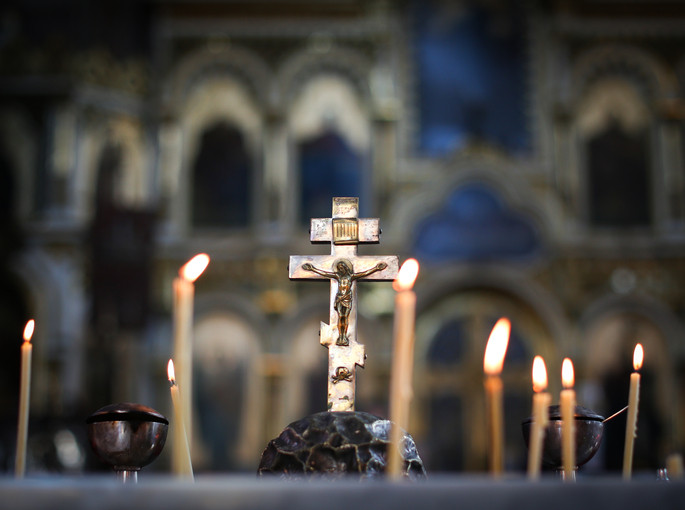Protecting the Russian World
 Wednesday, February 18, 2015 at 10:27AM
Wednesday, February 18, 2015 at 10:27AM 
Christians in Crimea and eastern Ukraine are suffering religious persecution at the hands of the Russian government and pro-Russian separatists, respectively. Based on numerous reported cases*, it appears that this persecution is largely due to Russia’s escalating anti-Western sentiments, as well as its desire to assert the dominance of the Orthodox Church of the Moscow Patriarchate.
Russia’s aggressive actions in Ukraine are attempts to purge the nation of Western influence, which includes all religions other than Russian Orthodoxy. Russia has also isolated itself from the international sphere, and the government is using anti-Western propaganda to fuel support for its escalating aggression in Ukraine.
Russia’s actions in Crimea and its support of the pro-Russian separatists in eastern Ukraine have already significantly impacted the religious diversity in these regions, and have resulted in hundreds of cases of severe religious persecution. The following groups are the most responsible for this religious persecution:
- Pro-Russian separatists (separatist groups, such as the Donetsk People’s Republic)
- Religious leaders of the Orthodox Church of the Moscow Patriarchate
- Fanatical movements, such as the Russian Orthodox Army
- Cossacks - paramilitary groups
Religious Persecution in Crimea
Following Russia’s annexation of Crimea in March 2014, the Russian government ordered all religious organizations in the region to re-register in accordance with Russian legislation. As of January 1, 2015, there were 2,220 registered religious organizations in Crimea, with only 1,546 operating as legal entities. Religious organizations belonging to the Orthodox Church of the Kiev Patriarchate, the Ukrainian Greek Catholic Church, and the Crimean Tatars have experienced the greatest difficulty with the registration process.
In addition to re-registration requirements, Russia has been using the fight against Western “terrorism” and “extremism” as an excuse to persecute members of pro-Ukrainian religious organizations in Crimea. Searches have been conducted in locations where religious organizations hold services, religious literature has been confiscated and banned, and interrogations have been conducted. Many Christian pastors and Catholic priests have been forced to flee Crimea due to death threats, property confiscation, and immigration issues. A number of buildings belonging to the Orthodox Church of the Kiev Patriarchate have also been transferred to the Russian Orthodox Church.
Overall, Russia is attempting to bring all religious organizations in Crimea under its own religious policy so that it can establish the supremacy of the Orthodox Church of the Moscow Patriarchate in the region. This will subsequently allow the Russian government to expand its power in the region.
Religious Persecution in Eastern Ukraine
In 2014, hundreds of Christians in eastern Ukraine suffered religious persecution by pro-Russian separatists. On May 16, 2014, the Donetsk People’s Republic, the prominent pro-Russian separatist group in the Donetsk region, adopted a “constitution,” which asserted the supremacy of the Orthodox Church of the Moscow Patriarchate. Russia’s anti-Western propaganda further motivated the separatists to assert the dominance of Russian Orthodoxy in eastern Ukraine, which has led to severe religious persecution of Christians in the region.
Numerous Christians suffered abduction, torture, arson, property confiscation, death threats, physical violence, expatriation, and even murder at the hands of pro-Russian separatists in eastern Ukraine. These Christians were persecuted solely because they did not belong to the Orthodox Church of the Moscow Patriarchate. Those who were tortured suffered various injuries, including beatings, stab wounds, broken bones, dislocated joints, or burns from electric shocks.
In addition to violent persecutory actions against Christians, pro-Russian separatists also seized numerous churches and other Christian facilities in the Donetsk and Lugansk regions of eastern Ukraine in 2014. While some churches were burned to the ground, most of them are now used as barracks, warehouses, or weapon storage, while others have been transferred to the control of the Orthodox Church of the Moscow Patriarchate.
The Good News Church in Slavyansk is one notable example of a church that was seized by pro-Russian separatists in the Donetsk region. In April 2014, several separatists entered the church and forced the congregation to lie on the ground while they searched for pro-Western materials. Some days later, they confiscated the church, its rehabilitation center, and its orphanage to convert them to military facilities. While the church was reopened after the Ukrainian Army regained control of Slavyansk, the majority of the churches seized in eastern Ukraine remain under separatist control.
Overall, the pro-Russian separatists are persecuting Christians in the Donetsk and Lugansk regions who do not belong to the Orthodox Church of the Moscow Patriarchate, or who they suspect of being pro-Western. By persecuting these Christians, the separatists are allowing greater Russian dominance in eastern Ukraine.
In 2014, hundreds of Christians suffered religious persecution at the hands of the Russian government in Crimea and pro-Russian separatists in eastern Ukraine. Additionally, more than 100 churches, Christian missions, orphanages, rehabilitation centers, educational institutions, research centers, and charities were confiscated or closed in these regions. Today, tens of thousands of Christians, as well as other religious minorities, in Crimea and eastern Ukraine live in fear of being kidnapped, tortured, or killed.
Political and religious leaders from Russia and Ukraine have been holding meetings targeted at achieving peace in Crimea and eastern Ukraine, and while the Russian government continues to pursue its own objectives in Ukraine, it is essential that these meetings continue. The February 15, 2015 ceasefire is an opportunity for peace and increased religious freedom in Ukraine, so long as Russia adheres to the agreement.
*Mission Eurasia’s full report on reported cases of religious persecution is available here for your review: http://rmfreedomblog.squarespace.com/storage/special-roundtable-washington-2015/Religious%20Persecution%20in%20Eastern%20Ukraine%20and%20Crimea%202014_Redacted.pdf

Reader Comments